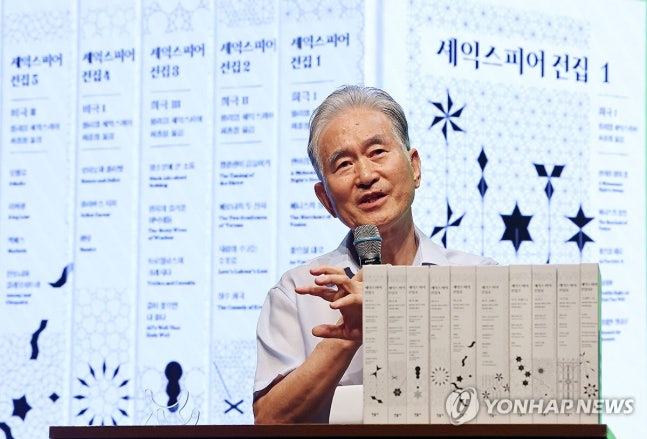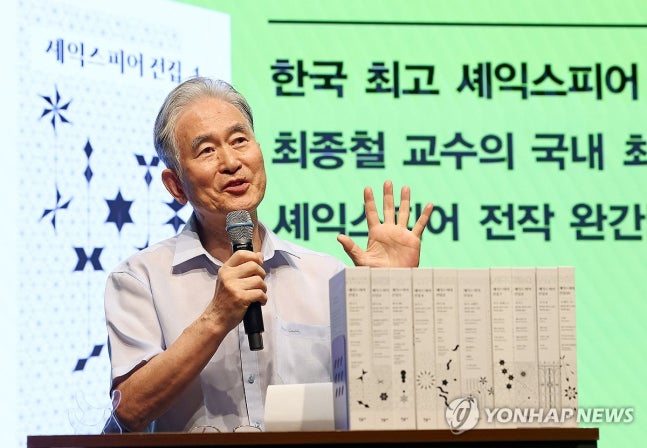Choi Jong-chul, Yonsei University Emeritus Professor, Completes Translation of Shakespeare’s Complete Works
Total of 5,824 pages published by Minumsa… “The most difficult was the dense ‘Macbeth'”,
,
,

Professor Choi Jong-chul, commemorating the completion of the translation of Shakespeare’s complete works
(Seoul=Yonhap News) Reporter Ryu Young-seok = Choi Jong-chul, a renowned Shakespeare authority in Korea and an honorary professor at Yonsei University, speaks at a press conference commemorating the completion of the translation of Shakespeare’s complete works at the Roh Moo-hyun Citizen’s Center in Jongno-gu, Seoul on the morning of the 3rd. 2024.9.3 [email protected],
,
, ” (Seoul=Yonhap News) Reporter Lee Eun-jeong = Choi Jong-chul (75), an honorary professor at Yonsei University and a leading figure in Shakespeare scholarship in Korea, has completed the translation of his complete works (all works) in ‘Shakespeare’s Complete Works’ (10 volumes in total). “,
,
, ” It has been 10 years since Minumsa began the series of Shakespeare’s Complete Works with Professor Choi’s poetic translations, and over 30 years since he devoted himself to translating Shakespeare’s works in verse form starting from ‘Macbeth’ in 1993. “,
,
, ‘ At a completion ceremony held on the 3rd at the Roh Moo-hyun Citizen’s Center in Jongno-gu, Seoul, Professor Choi said, “The feature of Minumsa’s series is the poetic translation I first attempted in Korea in 1993,” explaining, “I applied the rhythm of our poetry (samja-jo, three-four rhythm) to convey the emotions and thoughts that Shakespeare delivers in Korean vividly.” ‘,
,
, ‘ Professor Choi also found the significance of this complete translation in the reception and translation of Shakespeare’s works. ‘,
,
, ‘ He said, “In the 1920s, partial translations of Shakespeare began to appear in Korea,” and emphasized, “At that time, Shakespeare’s works came through Japan, where due to the structural constraints of the language, mainly prose translations were scarce. With this complete collection, we have achieved cultural independence from the influence that lasted a hundred years in Japan.” ‘,
,
,

Professor Choi Jong-chul who translated Shakespeare’s complete works
(Seoul=Yonhap News) Reporter Ryu Young-seok = Choi Jong-chul, an honorary professor at Yonsei University and a leading figure in Shakespeare scholarship in Korea, speaks at a press conference commemorating the completion of the translation of Shakespeare’s complete works at the Roh Moo-hyun Citizen’s Center in Jongno-gu, Seoul on the morning of the 3rd. 2024.9.3 [email protected],
,
, ‘ In 2014, Minumsa planned the series of Shakespeare’s Complete Works with a total of 10 volumes to commemorate the 450th anniversary of the birth of William Shakespeare (1564~1616). Between 2014 and 2016, they published five volumes consisting of the four major tragedies and comedies of Shakespeare, as well as sonnets, and after 10 years added another five volumes including problematic tragedies, romances, historical dramas, and more. ‘,
,
, ” The 5 newly released volumes include ‘Shakespeare’s Complete Works 2-Comedies II’, ‘Shakespeare’s Complete Works 3-Comedies III’, ‘Shakespeare’s Complete Works 6-Tragedies·Romance’, ‘Shakespeare’s Complete Works 8-History I’, ‘Shakespeare’s Complete Works 9-History II’. “,
,
, ‘ The complete set of 10 volumes consists of 10 tragedies including the four major tragedies, 13 comedies, 15 additional works including historical plays and romances, 3 poems, and 154 sonnets, totaling 5,824 pages. ‘,
,
, ” Shakespeare’s plays contain over half of their dialogue in verse form. Masterpieces like ‘Hamlet’ and ‘King Lear’ contain 75%, ‘Othello’ 80%, and ‘Macbeth’ an impressive 95% of dialogue in verse form. “,
,
, ‘ Professor Choi explained, “Shakespeare used verse for characters of high rank or formal dialogue with refined structures, and used prose for lower-class characters or comedy.” ‘,
,
, ” He adapted Shakespeare’s ‘a-ba-a-b quatrain’ format based on our poetry’s three-four rhythm to give it a rhythmic quality. For example, he translated the famous line from ‘Hamlet’, ‘To be, or not to be, that is the question,’ to ‘존재할 것이냐, 말 것이냐, 그것이 문제다.'”,
,
, ‘ He mentioned, “It took time to conclude that three-four rhythm can best preserve the feeling of sound,” and said, “The limitation in the number of characters per line led to omission of particles and object markers, and compressed metaphors create more tension than prose translations.” ‘,
,
,
![Minumsa's image of Shakespeare's Complete Works
[Provided by Minumsa. Redistribution and DB prohibited]](https://imgnews.pstatic.net/image/001/2024/09/03/AKR20240903047151005_03_i_P4_20240903145823813.jpg?type=w647)
Minumsa’s image of Shakespeare’s Complete Works
[Provided by Minumsa. Redistribution and DB prohibited] ,
,
, ” He pointed out ‘Macbeth’ as the most challenging work to translate. “,
,
, ‘ Professor Choi said, “\’Macbeth\’ was the most difficult due to its high density,” and added, “\’a-ba-a-b quatrain\’ has many short phrases, symbols, and compressed sentences. I chose ‘Macbeth’ as the first translation work because it is the most poetic.” ‘,
,
, ‘ Although there were moments in the 30 years where he wanted to give up, he reflected, “The joy given by the demanding work outweighed the pain.” ‘,
,
, ‘ He described Shakespeare as “a person who approached the truth of emotions,” and said, “The joy his plays bring is when you connect with the truth.” ‘,
,
, ‘ He advised, “People who have read Shakespeare\’s works and those who haven’t experience different internal changes,” and added, “When you read aloud, that moment comes, and those who have and have not experienced it see life, themselves, and the world in different ways.” ‘,
,
, ‘ Before this complete collection was completed, in 2016, Professor Choi\’s mentor, Yoo Sang-seob, an emeritus professor at Yonsei University, published a verse translation of Shakespeare\’s complete works (Literature and Wisdom).’,
,
, ‘ When asked about the differences between the two collections, Professor Choi replied, “It is difficult for me to evaluate the direct descendant, so I leave it to the readers,” and added, “However, my mentor completed the vast work in 10 years, so I feel like he was a bit rushed. It’s hard to make a qualitative evaluation and comparison.” ‘,
,
, ‘ [email protected]’,
,
,

